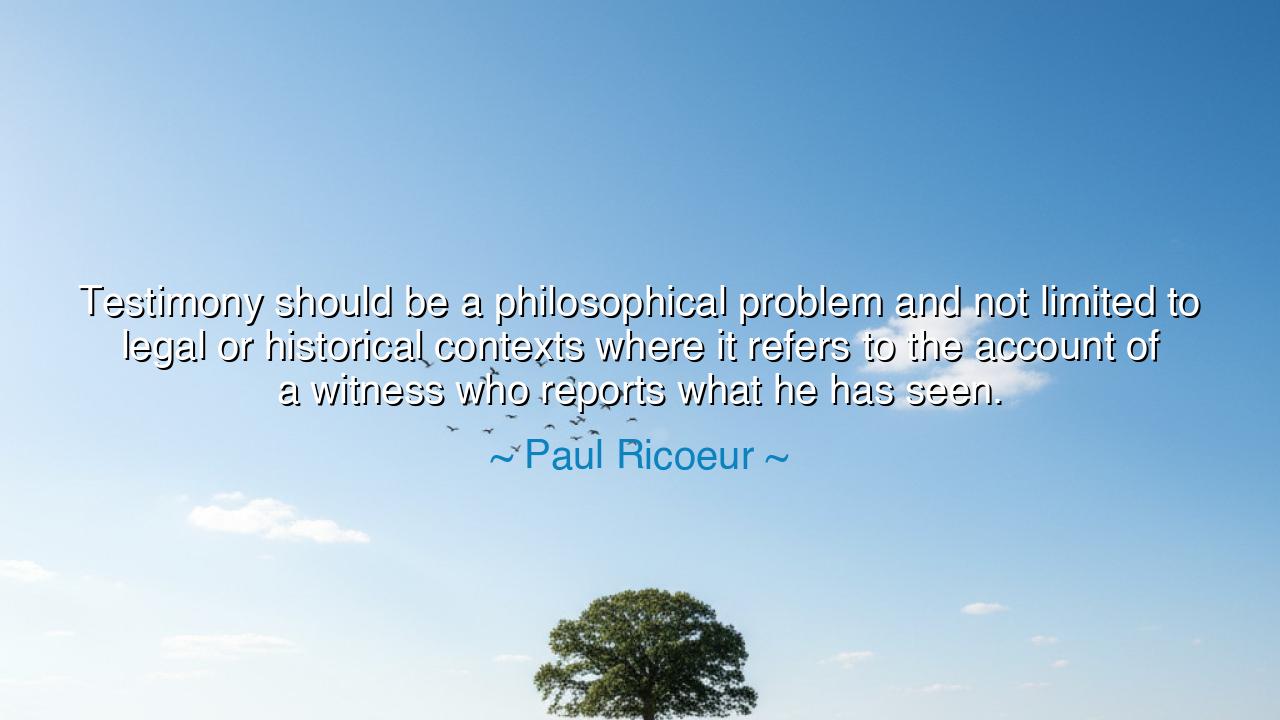
Testimony should be a philosophical problem and not limited to
Testimony should be a philosophical problem and not limited to legal or historical contexts where it refers to the account of a witness who reports what he has seen.






Hear, O seekers of wisdom, the solemn words of Paul Ricoeur: “Testimony should be a philosophical problem and not limited to legal or historical contexts where it refers to the account of a witness who reports what he has seen.” These words invite us to look beyond the courtroom and the archive, beyond the narrow halls where testimony is treated as evidence, and to see it instead as a mystery of the human condition. For what is testimony but the act of bearing witness to truth, memory, and experience—an act that is not confined to law or history, but woven into the very fabric of our lives?
The ancients knew that the spoken word carries more than mere fact—it carries the weight of existence itself. A man who testifies does not merely recount what the eye has seen; he offers his very self as a vessel of truth. The philosopher sees this as a profound problem, not because testimony is faulty, but because it requires trust. When one person says, “I have seen,” the listener must decide: shall I believe? Shall I let another’s word shape my understanding of reality? Thus testimony becomes not only legal evidence, nor historical record, but a philosophical encounter between one soul and another.
Consider the tale of the Holocaust survivors after the Second World War. Their testimonies were not merely legal reports to convict the guilty, nor dry documents for historians—they were cries of the soul, struggles to give voice to suffering so immense that words themselves seemed to break beneath its weight. Primo Levi, Elie Wiesel, and countless others bore witness, not only to facts but to the abyss of human cruelty. Here Ricoeur’s teaching comes alive: testimony is not just an account of what is seen; it is the bridge between memory and meaning, between survival and the world’s recognition.
But testimony is not limited to the tragedies of history. Each act of speaking truth—whether a child declaring their pain, a friend confessing their struggle, or a prophet calling out injustice—is testimony that demands to be heard. It is philosophical because it asks: what does it mean to believe another? What is the responsibility of the witness who speaks, and the responsibility of the listener who hears? To dismiss testimony as mere evidence is to miss its power to shape identity, trust, and community.
Ricoeur’s words also remind us of the fragility of testimony. For what if the witness lies? What if memory falters? What if the truth cannot be spoken clearly? These questions make testimony a true philosophical problem—not because it fails, but because it reveals the deepest tensions of human communication: the interplay of truth and doubt, of memory and forgetting, of presence and absence. To wrestle with testimony is to wrestle with the limits of what it means to be human.
The lesson for future generations is this: treat every testimony with reverence, for it is more than a report—it is the offering of a human soul. Listen with discernment, yes, but also with compassion. Do not reduce the words of another to mere evidence or data, but hear them as part of the unfolding of truth in the world. Just as the ancients gathered in circles to listen to poets, prophets, and elders, so must we gather our hearts to receive the testimonies of those around us.
Practical action lies before you: when others speak of their experiences, resist the urge to doubt hastily or to treat their words as mere tools for judgment. Instead, ask what their testimony reveals about the human condition, about suffering, hope, and endurance. In your own life, speak truth with courage, knowing that your testimony may one day be the seed of wisdom for another.
So let it be remembered: testimony is not only for courts and chronicles, but for the very soul of philosophy. To bear witness is to declare that one’s life has meaning, and to listen is to affirm that meaning in the shared light of human existence. Thus, the act of testimony, both given and received, becomes not merely evidence of the past, but a sacred path to wisdom.






AAdministratorAdministrator
Welcome, honored guests. Please leave a comment, we will respond soon